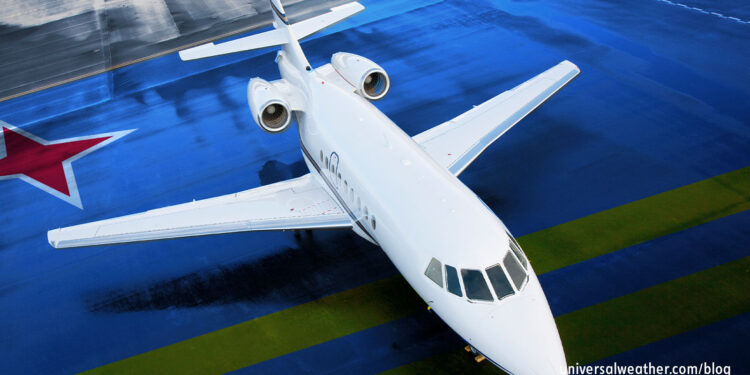Business Aircraft Operations to Aruba: CIQ Information

This is a post by author Claudio Stamper. At the time of its writing, Claudio served as general manager for Universal Aviation Aruba – Oranjestad, which discontinued operation of the GAT in January 2018.
This business aviation blog post is part of a series on operating in Aruba and continues from our last article: “Business Aircraft Operations to Aruba: Permits, PPRs, Flight Planning, Weather & NOTAMS.”
When conducting business aircraft operations to Aruba, be aware of flight plan lead times, procedures, and flight plan revision policies. While schedule changes and delays can be easily accommodated, it’s always best to coordinate flight plan changes with your ground handler.
The following is an overview of what you need to know:
1. What are high-traffic considerations for Aruba?
Aruba’s high season includes Easter, October, and December-February, with the majority of transient traffic coming in from South America. During high-season periods, aircraft parking availability is limited, and overnight parking may not be possible.
2. What are CIQ considerations for Aruba?
Passengers and crew must clear Aruba Customs, Immigration, and Quarantine (CIQ) on every landing and departure – even if it’s just a tech stop. All clearance of private non-revenue and charter (non-scheduled commercial) aircraft is done at the Fixed-Base Operator (FBO). By regulation, when passengers clear CIQ, at least one crew member must accompany them through customs. CIQ clearance usually takes no more than 15 minutes if the ramp is not busy. During busier periods clearance may take up to 30 minutes. CIQ will check passports, arrival/departure cards, general declaration, EPIC form, and luggage. Security clearance is required for departures (even for tech stops) but not for arrivals.
3. What is an EPIC form?
Aruba requires completion of an EPIC form, which is similar to a gen dec. This can be filled out by your ground handler in advance. To fill out the form, your ground handler will need scanned copies of crew/passenger passports and aircraft information including tail number, aircraft type, operator name, seating capacity, color, and serial number of aircraft. Both an EPIC form and a gen dec are needed to clear CIQ.
4. CIQ clearance takes place in the FBO
Except for air ambulance flights, onboard CIQ clearance is not possible in Aruba. All general aviation and diplomatic flights clear CIQ in the FBO. The FBO in Aruba is separate from the commercial terminal, and passengers/crew members will never clear alongside commercial pax.
5. Know requirements for arrival/departure cards
Arrival/departure cards are required for every passenger whether for a technical or overnight stop. Your ground handler will normally fill out the arrival/departure cards in advance of your arrival if all the crew/passenger information is sent in advance. If the ground handler completes these forms, minimal completion will be required on arrival. Crew members only need to complete arrival/departure cards if they are staying in Aruba 24 hours or more.
6. What about visa requirements?
Visas are required for certain nationalities and, when required, must be obtained prior to arrival. Without a required visa, passengers and crew members will not be permitted into the country. Note that visa requirements apply regardless of the type of flight. A U.S. visa will be accepted in lieu of an Aruba visa. Crew members only require visas for Aruba if staying overnight. More information on entry requirements can be found at “Requirements for Entry Into Aruba as a Tourist.”
7. Are there fees associated with CIQ?
There is a one-time CIQ charge per flight of 33 USD. Additionally, there’s a charge of 55 USD per passenger which includes airport tax, security surcharge, and terminal fees. This is usually paid by the ground handler on the operator’s behalf and billed at a later time. CIQ levies an additional charge for late-night arrivals between 2200 and 2359 local. Arrivals after 2359 local are permitted only for air ambulance flights, and CIQ charges an additional fee for such arrivals amounting to approximately 20% of your ground handling charge.
8. Are there agricultural, pet, and weapons restrictions?
Onboard in-flight catering, including meats and fruits, can normally be offloaded and brought into Aruba. Meat products from South America without a proper seal, however, are not permitted into the country. More information can be found here. While no animals from South America are permitted into Aruba, it’s possible to bring a pet, from any other region, if you present a vaccination certificate and evidence of where the pet is from. If you have guns onboard, even for tech stops, it’s necessary to check with police and CIQ in advance to confirm applicable requirements and procedures.
9. Additional reading: Business Aircraft Ops to Aruba – Series Index
Note: Links will be updated as articles are published.
- Part 1 – Airport operations
- Part 2 – Ground handling and security
- Part 3 – Catering, Cars, Pets & Guns
- Part 4 – Permits, PPRs, flight planning and weather
- Part 5 – CIQ information
- Part 6 – Fuel and hotels
Conclusion
Clearing CIQ in Aruba requires a special EPIC form in addition to standard clearance documentation. To avoid delays on arrival, have your ground handler pre-fill out arrival/departure cards, as well as the EPIC form.
Later, we’ll discuss fuel and hotels for Aruba and their impact on your trip.
Questions?
If you have any questions about this article or would like assistance planning your next trip to Aruba, contact us at operationalinsight@univ-wea.com.




